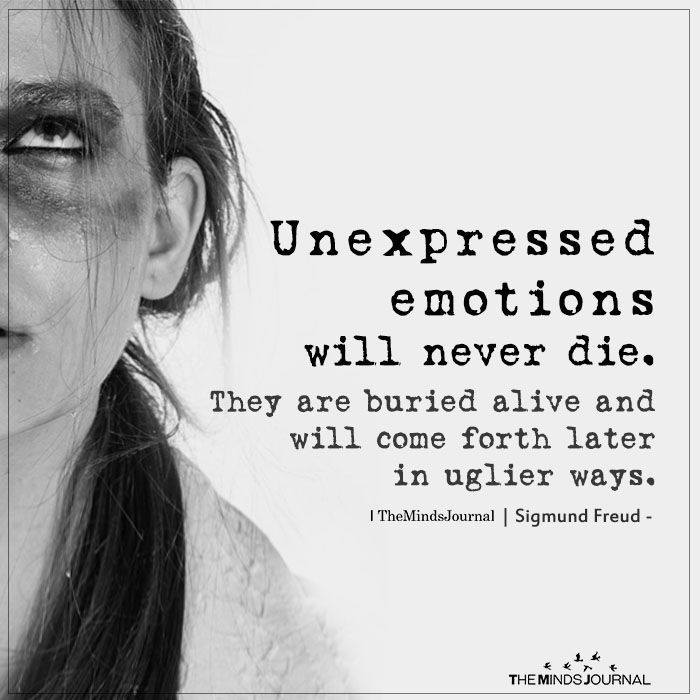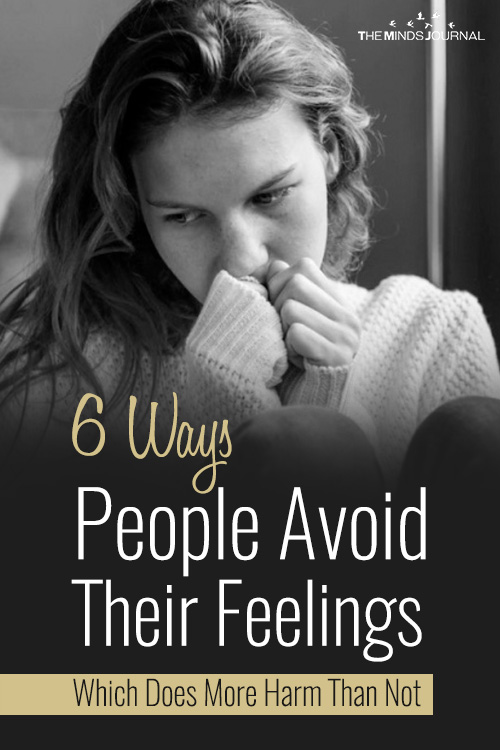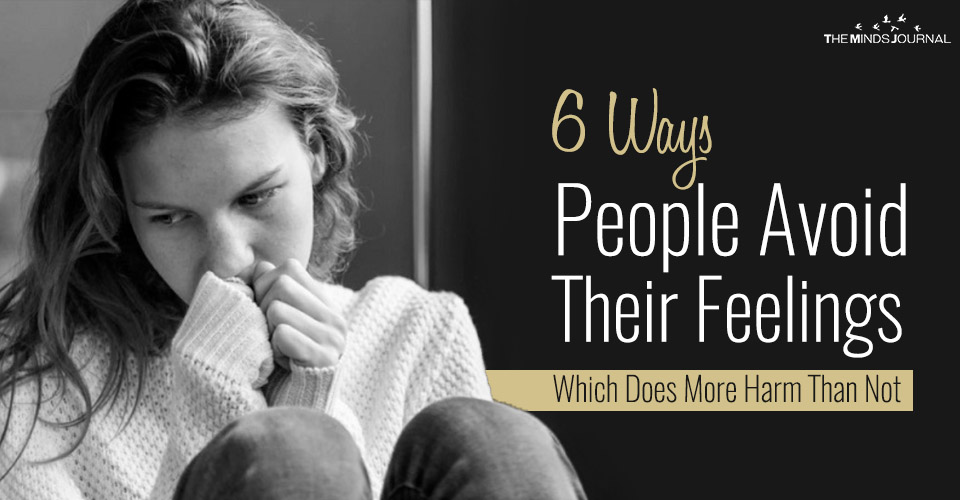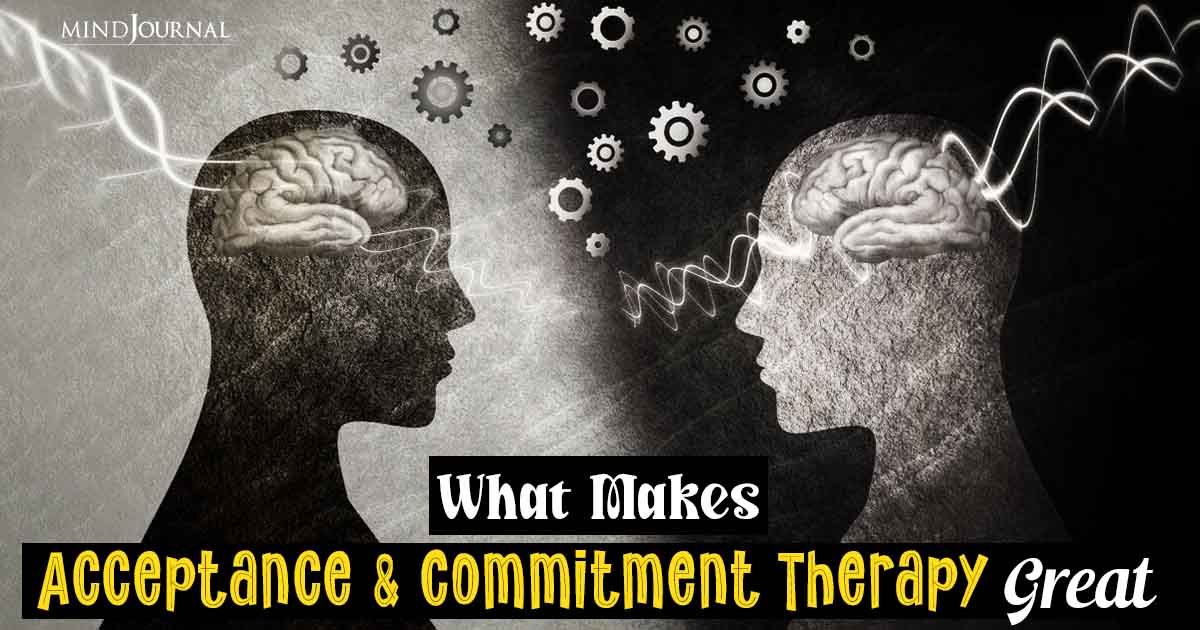If you keep avoiding your feelings, they might end up wreaking havoc in your psyche.

That one most crucial element which makes us who we are – humans – is our ability to experience and express a plethora of emotions. Can you imagine yourself without the ability to feel and respond to those feelings? You would rather not because sans emotions we lose a major part of our identity.
Life is beautiful solely because we are gifted with the superpower to feel. It indeed is a superpower! Without feelings, our life would be a plain canvas or one with monochromatic colours. But a coin is always double-sided.
Given a chance you can easily recall plenty of circumstances where you have wished you lacked emotions, cursed them and wondered why you could feel in the first place. We have all been there.
Emotions are signals to the body about ourselves and our surroundings – when we need to protect ourselves, when we need to prepare and when we need to let go. They give us feedback about our surroundings and whether or not it is safe for us to be in.
Once you shut your emotions off, you have potentially eliminated a powerful sense. Mostly this is how our story of destruction and damage begins. We do not harm ourselves by being vulnerable or feeling things, we do so when we try to sabotage the natural process of feeling.
What do we usually do when we feel overwhelmed with emotions?
Instead of letting the emotions flow, we do the worst by using all techniques at our disposal to ward off the feel; anything we can get hold of – avoidance, denial, ignorance or suppression to take control over our emotions. What we get oblivious of is that this only lead us to be psychologically more conflicted and devastated.
Alienating our emotions as a temporary solution only brings forth graver consequences in the future. As said by Sabaa Tahir in a A Torch Against the Night “Your emotions make you human. Even the unpleasant ones have a purpose. Don’t lock them away. If you ignore them, they just get louder and angrier.”
Read 6 Action Steps To Take When You Begin Feeling Overwhelmed
Here are 6 ways people avoid their feelings, which does more harm than not:
1. Denial:
Have you ever faced with a situation so triggering that you simply choose to believe it never happened? Or that nothing is wrong and you are okay?
If you answer in affirmation, you have already been there. When we experience something uncomfortable, embarrassing or traumatizing we simply choose to deny it because denying seems easier than confronting the difficult feelings. But it’s necessary to know that denial helps but only in limited quantities and time span.
As O’Neil says,“In other words, the more entrenched you get in denial, the harder it can be to pull yourself from it.”
Denial keeps us away from reality and hence makes it harder to get access to our true internal world. So the faster you acknowledge your emotions, however unpleasant they are, the faster you get in touch with reality, the quicker you get over the painful emotion.
2. Withdrawal:
Withdrawal is when a person does not want to interact with or participate in activities with other people, even the ones they initially liked interacting with. It is a total cut off from human contact and is different from occasional withdrawal from socializing.
Some people withdraw because they feel overwhelmed around other people or when they fail to control their intimidating negative emotions like anger, jealousy, envy, guilt, shame, frustrations etc which places them in a humiliating situation. Others might also withdraw from situations and people because they do not want to feel the negative emotions evoked by the stimuli.
Of Course, this is a maladaptive way to deal with conflicting and undesirable emotions because one cannot withdraw permanently for life just to avoid feeling negative emotions. Withdrawing also results in the person slipping into loneliness.
3. Avoidance:
Avoidance is basically the first step to ultimately withdrawing. A person avoids as long as possible but withdraws when all other means to ward off the feelings goes in vain.
If you are at a party and someone is trying to flirt with you and you are not liking it. Maybe your first thought will be to avoid him/her. When we are faced with an unwanted situation, our primal instinct is to either face or avoid it, something we know as “fight or flight”. This makes avoidance a defense mechanism to protect ourselves from undesirable situations.
Often when we experience negative emotions we try to forcibly push it aside by dictating to ourselves that the triggering stimuli are not potent enough. When someone says something bad about us, if we feel hurt and still tell ourselves to “Just forget about it”, “Leave it”, “It’s not a huge matter”, we are actually not validating our true feelings. We rather are avoiding it.
Read 10 Signs He’s Playing With Your Emotions
4. Humour:
It is always easy to laugh away your pains than to explain oneself and others how you feel. It’s surprising to note that people who have experienced emotional neglect, lack of love and understanding in childhood uses more jokes and humor as a defense to light up others and themselves.
Making jokes and laughing at them is easier than facing our discomfort. But over time, if you always laugh away your disturbing feelings you gradually deprive yourself of empathy, understanding and support that you deserve.
People start believing that your jokes are a cause of your genuine happiness and contentment in life and not as a shield to protect your unacceptable emotions.
5. Emotional eating:
Imagine a person literally eating as much as possible to stuff down whatever he/she is feeling, to push the feelings back to where it came from. Our main reason to eat is to satisfy our physiological need of hunger but many people end up eating to relieve stress and cope with feelings like loneliness, boredom, self-hatred, and sadness.
Every time you feel sad you end up ordering yourself a pizza to “make yourself feel good” or just sit with a pint of ice-cream ‘cause you are feeling lonely or don’t feel productive.
When eating becomes your basic coping strategy from daily problems, you never really get a chance to address the feelings underlying it. This type of ‘emotional eating’ gets you stuck in an unhealthy cycle. Eating might be temporarily rewarding but the feelings that triggered it is left unresolved, which will recurrently come back.
Read What is Emotional Eating and 7 Expert Ways To Combat It
6. Distraction:
Every single day we consciously force ourselves to distract ourselves from unacceptable things to regain our focus on things we feel are comparatively easier to handle.
Avoiding our feelings by distracting ourselves is something which we do on a daily basis to keep freeing ourselves from the emotional trauma we will have to otherwise go through.
Suppose you are upset over how your boss criticized you at work and now you are completely engrossed in ruminating over the conversation and the feelings of worthlessness shame, guilt, self-loathing that the incident triggered in you. It is very likely that you would keep yourself busy by watching tv, reading books or playing games over the phone just to distract yourself from all the unhealthy thoughts plaguing your mind.
Instead of trying to find out ‘whys’ and ‘what’ of the incident, you end up trying to distract yourself from the emotion which again is a useless way of coping.
Distraction can be temporarily beneficial but over time it will come out in sneaky ways like through displacement – in which you will ultimately end up unconsciously displacing these suppressed emotions on people and things other than the actual trigger.
Why is avoiding our true feelings maladaptive for our mental health?
Feelings, thoughts, and emotions we experience over our lifetime are never completely forgotten. Unwanted feelings, desires, and emotions which are unacceptable to society make it difficult for us to freely express them.
Some desires and impulses like hatred, jealousy and sexual impulses are destructive in nature if acted on and can get us in trouble if fully expressed, so we find it legitimate to push them within ourselves rather than express them. When we hinder our natural flow of emotions, we are not being genuine to ourselves.
Unexpressed emotions are badly regulated emotions. We think of these emotions as forgotten but in reality, you are actually pushing it to your subconsciousness. Suppressed emotions are nothing but extra energy that you are carrying within yourself which interferes with the homeostasis of the organism.
As you keep suppressing emotions over a longer period of time, you make it stronger as you are not allowing it to dissipate through any means.
Keeping on pushing your unacceptable impulses and emotions at the back of your mind instead of addressing them or releasing it through cathartic means, it will one-day build-up to the point of leaking through more dangerous means. Imagine a water pipe with a vault on it. The more the volume of water flows through the pipe, the higher the pressure and unless you release the vault, the pipe will start leaking from cracks.
Suppressed emotions find a way through recurrently disturbing nightmares and dreams.
Concealing emotions can give rise to stress-related physiological reactions like an increase in heart rate, lightheadedness, dryness of mouth, etc. The repression of negative emotions such as anger gives rise to elevated levels of stress. The occurrence of stress is as a result of the social disapproval of overt emotional expression that cause repression which is itself intimidating and stressful.(1)
When emotions are dysregulated they might also bring about symptoms of depression over the long run. A research conducted by Larsen et al. (2012) the researchers investigated the possibility of a positive association between repression of emotion and symptoms of depression in adults and adolescents under the influence of peer victimization and parental support.
What effects do suppressed emotions have on our health?
Related literature builds on the venerable idea that people who chronically inhibit the expression of their true emotions may be more prone to a wide range of diseases than those who are emotionally expressive (Alexander, 1939; Freud, 1961).
Also in current times, there have been empirical reports of an association between the inhibition of anger and hostility on the one hand and essential hypertension and coronary heart disease on the other(2).
Studies by Pennebaker and his colleagues (1997) demonstrated that individuals who repress their emotions also suppress their body’s immunity, making them more vulnerable to a variety of illnesses ranging from common colds to malignant cancer. Cancer onset and progression is also highly dependent on how emotionally expressive you are. (Gross, 1989; Temoshok, 1987).
Looking at the entire picture, it is clearly conclusive that emotions, however unacceptable it might be if left unexpressed or dysregulated will lead to consequences which are far more fatal than imagined.
Read 7 Stages of Change: How to Cope with The Emotions Of Each
References:
- Buck R. (2003) Emotional expression, suppression, and control: Nonverbal communication in cultural context. , Journal of Intercultural Communication Research32, 175-187.
- Appel, Holroyd, & Gorkin, 1983; Diamond, 1982; Harburg et aI., 1973; Holroyd & Gorkin, 1983; MacDougall, Dembroski, Dimsdale, & Hackett, 1985; also see Engebretson, Matthews, & Scheier, 1989.









Leave a Reply
You must be logged in to post a comment.